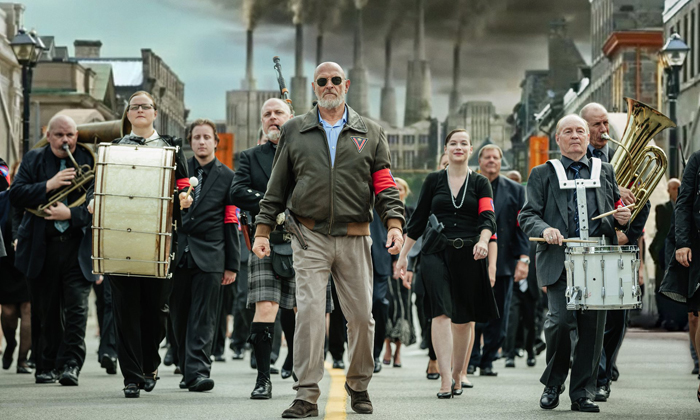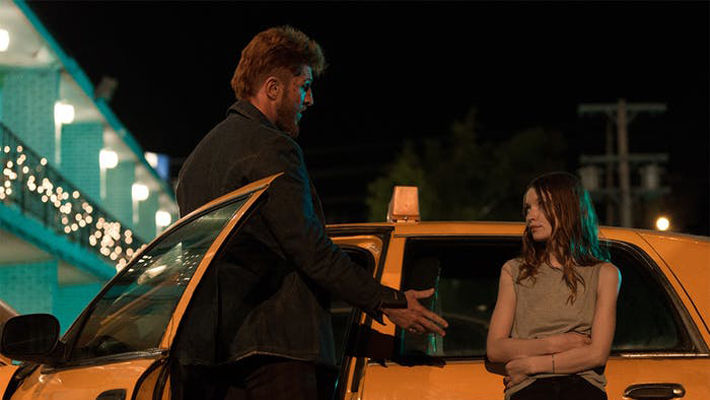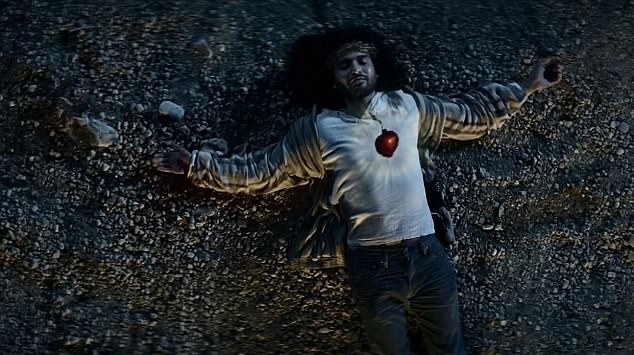Before anything else; before the guns and new gods and old gods becoming new gods, before we can reasonably discuss any of these things, I need to get the leprechaun off my back. So let us all take a moment to praise Mad Sweeney, asshole extraordinaire, needlessly tall leprechaun and cosmic punching bag. Sweeney is, in miniature, what makes American Gods such an essential show. He is a perfect example of how Bryan Fuller and Michael Green have taken Neil Gaiman’s source material as a jumping off point and expanded and enhanced it into something richer, stranger, funnier, more intriguing.
American Gods must tread a careful path; it is the sort of show that will draw much of its viewing audience from a pool of people who have read the primary source and have very strong opinions about what cows graze sacred in its fields. Inversely, there is no true purpose in adapting the book to screen if the presentation is exactly the same. Though I have and will always love the book, the show is rapidly overtaking it, by sheer force of charm and careful character work. Let’s sideline the leprechaun for a minute and talk about our ostensible heroes.

Shadow and Wednesday begin the episode on the move. They are headed to a town where Wednesday can recruit some backup, via the gun-slinging Vulcan, an old god who has found a way to outsource his need for worship in a new society. Vulcan is American Gods at both its most ham-fisted (I know normally this is a word with a negative connotation, but not here; here we just mean “salty and delicious and formerly of a pig-born, but also really, really not subtle) and its most slyly insidious. There is nothing subtle about the implications of a bunch of Americans gleefully shooting guns in the air. Nor in their red arm-bands, a mere swastika away from slapping viewers across the face with a limp, fascist dick. However, there is no moment where Vulcan explicitly states that this small town is white supremacist or that Shadow isn’t welcome among their ranks. He laces it through the soft delivery of questions like, “Have you ever seen a man hanged?” or in his refusal to share his booze. That Wednesday appeals to Vulcan specifically with a phrase like, “They’re taking over America” tells us a great deal about both Vulcan and Wednesday. Yes, Vulcan is a small-minded bigot, who has happily created a congregation of like-minded bigots, and secured them through fear of change; but Wednesday….oh, Wednesday. He may not believe in the things he is saying to court Vulcan (and consider briefly the implications and importance of belief within this universe) but he is perfectly willing to indulge in the rhetoric to achieve his ends. It is an unavoidable fact, well before the end (which I will not ruin here, lest I be branded with the shameful epithet of “spoiler”) that Wednesday is not, in fact, a good guy. What he is is something more nebulous, less well defined. And by continuing to travel with him, going along still more or less passively, we must also question if Shadow is truly a good guy. Do we love him? Of course. But what is the limit of his own moral elasticity? We are not being given easy answers to easy heroes.

Meanwhile….
Mad Sweeney and Laura meet up with Salim as they are trying to steal his cab to get to Kentucky. Salim is looking for his Jinn, and the three improbable allies set out on a road trip together. Sweeney pokes at both of his cohorts; taunting Laura about her rotting body, telling Salim (sweet Salim, who, I think we can all agree, is a precious cinnamon roll, too pure for this world…) that he talks to much. He is a supreme and unwavering asshole, and I truly can’t get enough of him. He and Laura bicker and insult and overall are great fun to watch together, but gradually, grudgingly pull out truths about their current situation. I do not know what the writers plan to do with this unlikely trio; but it is undeniable that while kissing Shadow may have made Laura’s heart beat and glow, the first time she has sparked, truly, is in the presence of Sweeney. It would be a bold subversion of traditional story tropes if the love that brought Laura back to life didn’t turn out to be the great love of her life, but merely a stepping stone on her way to finding what she truly wants – and in that respect, it would also be the logical narrative through line. She wasn’t happy with Shadow in life. Why should she be in death?
The “Somewhere in America” sequence is particularly brutal this week. We see Mexican immigrants trying to come to American shores, surviving river rapids with the help of an understated Jesus (the actor had such a genuinely angelic face that it felt like no great surprise to see him walk on water) only to be slaughtered by trigger happy border patrollers. Torn down like game by Vulcan brand bullets, the weight of the opening massacre looms heavily over the episode. Beware of gods demanding blood sacrifices.

Despite the fact that American Gods is a show where, yes, Marilyn Monroe knocks out Technical Boy’s teeth with a blown kiss, and sure, our sweet Salim has some good loving with an actual, fire-eyed genie, but the genuinely bananas plot elements are not and will never be what makes the show great. It’s the power of the relationships, and the deep care given to characterization. Whittles and McShane remain a compelling and delightful force to watch on screen together. McShane is carefully cultivating layers of menace to his playful, rakish portrayal, and Whittles beautifully struggles against a growing affection for Wednesday, and a perfectly logical distrust for him. They are, to be highly reductive and simplistic, fantastic.
Still, for my money, the pair to watch is Laura and Sweeney. They bristle against each other, caustic and engaging. And the longer they can keep Salim along for the ride as their sweet, tempering third wheel, the better off the show will be. Only two more episodes left in this season, and Jonathan Tucker watch is on high alert. Until next week!

Solid review!